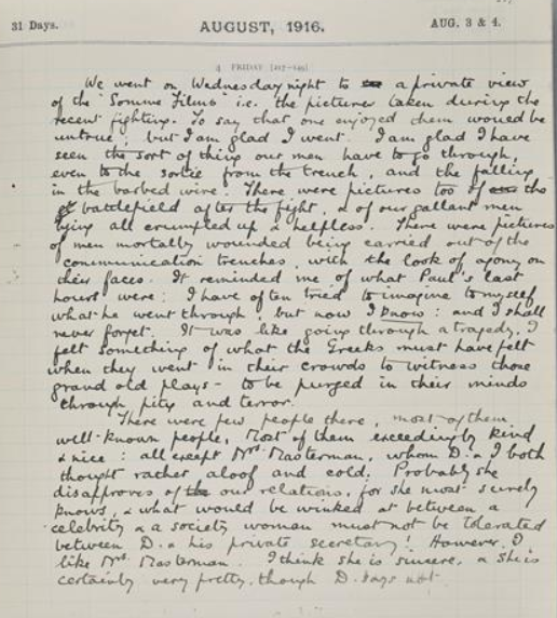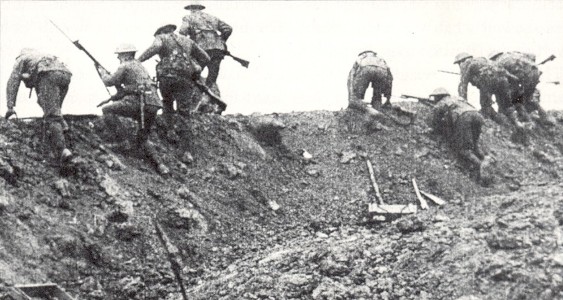Source: Gilbert Frankau, Gilbert Frankau’s Self-Portrait: A Novel of His Own Life (London: Hutchinson, 1940), pp. 143-146
Text: In the fullness of time Chambers departed, leaving me and Wilson in dual glory at the Grand Hotel, Rome. My main mission was to convince the Italians that we had several men fighting in France and Flanders – the Hun propaganda machine denying this daily, through a secretly subsidised press. “No War Here”, said a Welsh miners’ leader addressing a home audience – and the headline appeared in a Naples paper next day.
The battle films with which I had been supplied might have proved convincing. But Chambers hadn’t been able to sell them; and I could hardly persuade invited audiences to sit through them in free seats.
After some four fruitless weeks of travel I again took counsel with our ambassador; and dashed back to London.
There, I looted every scrap of official film I could find, including several priceless feet of General Cadorna, then generalissimo of the Italian armies, Lord Kitchener, and a sausage balloon taking the air at Queen’s Club.
With these, Muirhead Bone’s etching of a tank in action and complete orchestra scores for “The British Grenadiers”, “Tipperary” and other martial music, I returned to Italy, and took up my headquarters at the Hotal Cavour, Milan.
What Luca Comerio, the Italian cinema man, and I did to the official British war films in the solitude of his studio is nobody’s business but our own.
The very first caption thrown on the screen over the facsimile signature of “Capitano Gilbert Frankau, Stato Maggiore Inglese” (English General Staff) guaranteed the story of “La Battaglia dei Tanks” completely authentic.
And what a story! We printed twelve copies. Within ten minutes of the private preview we sold them all – my instructions were to make the thing pay if I could – to five renters whose theatres covered the whole of Italy.
Tears blinded even those hardboiled renters when a shell burst obscured the entire screen, and the film seemed to break, and that most telling of all our captains [captions] read, “Alas – alas, for the too-intrepid cameraman”. With muted music the effect on large audiences had to be seen to be believed.
Among the believers in the death of that mythical cameraman – for I never had the heart to disillusion Her Excellency – was Lady Rodd …
…That night in 1917 I took Rudyard Kipling – and two charming American women whose names escape the memory – to the theatre where my film had been showing since noon. Gerald Tyrrwhit, unpaid attaché at the Embassy, now Lord Berners, had trained the orchestra for me. They struck up “Rule, Britannia” – by pure coincidence – as we seated ourselves in the box.
Kipling watched the screen. I watched Kipling.
The tunes and that first captional guarantee of authenticity surprised him a little. But he did not even blink when he saw Marconi inventing the tank, or General Cadorna arriving for a conference with Lord Kitchener at which it was decided that the English army should attack on the Somme.
“Good work”, whispered my master. “How did you come to think of that fiction?”
Modesty kept silence. Our troops, tinted blue and brown, massed by night. The London Scottish appeared complete with band to “Auld lang syne” and “A wee doch and doris”. Then “Came the dawn of battle”; and my Queen’s Club sausage balloon rose to survey the German trenches.
Promptly the enemy planes – ours from Salisbury Plain – swooped to the attack, their machine guns chattering. (Tyrrwhit managed that rather well with his drums.) Down fell the balloon (tinted red, and two out of every three pictures excised, to say nothing of the men on the ropes, giving the effect of speed) in real flames.
“Gorgeous”, whispered Kipling. “Cost you a truss of hay, I expect.”
Our plans counter-attacked. A German Fokker, which looked a little like one of our own B.E.2C’s to Kingscote’s pupil in anti-aircraft gunnery, also fell in flames.
The crashed plane, I think, was a real picture. Then, it had no British circles under its wings. If anyone faked the Iron Crosses there, it was not done in Milan.
“But where are the tanks?” whispered Kipling. “We must live up to our titles.”
Again his fan kept silence while superimposed shell-bursts – the damn things never looked quite real, they waggled about too much – rained on our advancing infantry.
“Meanwhile…” read the next caption; and suddenly Kipling chuckled.
“Tanks to the rescue. The Devastating Blinders, eh! Grand”.
They were my own words, my very own dictionary-dredged Italian words; and I could not refrain from displaying my erudition.
“Blindati Devastatori means armoured devastators”, I corrected, as the tank-noses reared high to crush walls I could have sworn built in England, and swept on to the apocryphal attack.
But Kipling preferred his own translation, repeating to himself “devastating blinders”, till that thrilling moment when the mine blew, and spotless Highlanders stormed forward, bayonets flashing, at no double ever seen in France or Flanders to victory or death. We faded out on coloured flags and “Long Live the Allies” to a complete symphony of national anthems.
“What do you think of it?” I asked, as we walked the undarkened streets. (Even the Huns of 1914-1918 never dared to bomb the Eternal City.)
“Superb”, chuckled Kipling, “But you will be slain for this, my friend. Most indubitably you will be slain.”
Comments: Gilbert Frankau (1884-1952) was a British novelist and poet. His book Self-Portrait describes itself as a novel, but it is effectively an autobiography. Like many of the British literary intellgensia during World War I, he was recruited by the covert War Propaganda Bureau to promote British interests during the First World War. Frankau was sent to Italy to oversee the presentation of British official war films, starting in 1916 with the documentary feature Britain Prepared (1915). Behind the comic detail lies some useful and occasionally convincing detail about the presentation of war films. He may be referring to the British documentary feature The Battle of the Ancre and the Advance of the Tanks (1917), though that film in its original state had no fakery. Luca Comerio was a prominent Italian film producer. Rudyard Kipling, another War Propaganda Bureau recruit, was in Italy around May 1917 in preparation for writing an account of the Italian campaign, The War in the Mountains. Lady Rodd was the wife of the British ambassador to Italy.

